Global War on Terror - Silver Star - Army
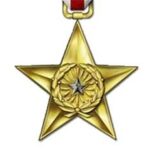 The records below contain the Army recipients of the Silver Star during the Iraq and Afghanistan conflicts, collectively known as the Global War on Terror.
The records below contain the Army recipients of the Silver Star during the Iraq and Afghanistan conflicts, collectively known as the Global War on Terror.
* Indicates Killed in Action (KIA), Missing in Action (MIA), Prisoner of War (POW), or Died Non-Battle (DNB)
![]()
UGANIZA, ROGER A.
Synopsis:
The President of the United States of America, authorized by Act of Congress July 9, 1918 (amended by an act of July 25, 1963), takes pleasure in presenting the Silver Star to Sergeant Roger A. Uganiza, United States Army, for conspicuous gallantry and intrepidity in connection with military operations against an armed hostile force while serving in support of Operation IRAQI FREEDOM in Iraq. Sergeant Uganiza's gallant actions and dedicated devotion to duty, without regard for his own life, were in keeping with the highest traditions of military service and reflect great credit upon himself, his unit, and the United States Army.


Synopsis:
The President of the United States takes pleasure in presenting the Silver Star Medal to Larry Underwood, Specialist, U.S. Army, for conspicuous gallantry and intrepidity in action while serving with the 1st Squadron, 4th Cavalry Regiment, 1st Infantry Division, during combat operations in support of Operation IRAQI Freedom, on 21 July 2004, in Iraq. Specialist Underwood was aboard one of two Bradley fighting vehicles returning soldiers from dismounted operations on 21 July 2004, when a roadside bomb struck the other Bradley, setting it afire and instantly killing the driver. Specialist Underwood and his team dismounted their Bradley and, after a brief unsuccessful attempt to free the driver's body, heard the screams of five soldiers trapped in the rear because the handle had jammed in the explosion. Hampered by heat, smoke and the sound of exploding ammunition, the men couldn't un-jam the door until Specialist Underwood thought to use his rifle as a pry bar. He opened the stuck door and freed the trapped soldiers just seconds before the Bradley's fuel cells exploded.
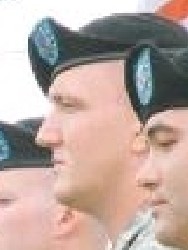

Synopsis:
The President of the United States of America, authorized by Act of Congress July 9, 1918 (amended by an act of July 25, 1963), takes pleasure in presenting the Silver Star to Staff Sergeant Dennis B. Unger, United States Army, for gallantry in action while serving as a Platoon Sergeant with Company C, 1st Battalion, 506th Infantry Regiment, 4th Brigade Combat Team, 101st Airborne Division, in action on 16 August 2008, in support of Operation ENDURING FREEDOM in Afghanistan. On that date, Staff Sergeant Unger was part of a 40-vehicle convoy heading back to FOB WARRIOR. About five kilometers from Highway 1, the main road circling Afghanistan, Staff Sergeant Unger and one of his squad leaders, Sergeant Steven Morrison, dismounted to clear the route before the vehicles passed. They came to a bridge and checked of Improvised Explosive Devices. The first vehicle crossed without incident, but as the second vehicle, a Humvee, drove up, an explosion blasted the vehicle and threw Unger and Morrison, who were standing next to the truck, at least 50 feet and knocked them unconscious. When he regained consciousness, Staff Sergeant Unger found his platoon leader in a dazed condition, and moved the first vehicle so it could have a better position to cover him. He and Sergeant Morrison then pulled the driver, who was trapped inside the Humvee, from the vehicle. As Staff Sergeant Unger treated the wounded, other soldiers fired back at the enemy to cover him. When MEDEVAC helicopters arrived to evacuate the wounded, Staff Sergeant Unger remained behind so as not to leave the remainder of the men without a platoon sergeant to command. His gallant actions and dedicated devotion to duty, without regard for his own life, were in keeping with the highest traditions of military service and reflect great credit upon himself, his unit, and the United States Army.
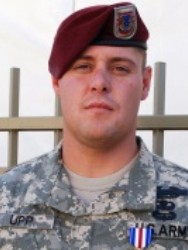

Citation:
The President of the United States of America, authorized by Act of Congress July 9, 1918 (amended by an act of July 25, 1963), takes pleasure in presenting the Silver Star to Staff Sergeant Christopher Thomas Upp, United States Army, for gallantry in action while serving with Company D, 2d Battalion (Airborne), 503d Parachute Infantry Regiment, 173d Airborne Brigade Combat Team, in action in support of Operation ENDURING FREEDOM in Afghanistan, on 31 July 2007. Staff Sergeant Upp's leadership and ability to motivate his Soldiers under extreme fire is a direct reflection of his spirit. Due to the actions of Staff Sergeant Upp and his mortar crew, Destined Company suppressed and destroyed several enemy fighters-the decisive factor in the survival of several other paratroopers. Staff Sergeant Upp's gallant actions and dedicated devotion to duty, without regard for his own life, were in keeping with the highest traditions of military service and reflect great credit upon himself, his unit, and the United States Army. NARRATIVE TO ACCOMPANY AWARD: On 31 July 2007, 25 to 35 enemy located in three different locations, conducted a simultaneous attack on the Chowkay Vehicle Patrol Base (VPB) from positions 250m to 350m on the high ground- the fourth time in less than a month. Enemy initiated with 107-mm. rockets used as direct lay and rocket propelled grenades from the closest positions. Staff Sergeant Upp stood in the mortar personnel bunker at the time of the attack. He called higher headquarters with a SALT report and then, without hesitation, led his 4 man crew through 75 meters of open terrain, under intense machine gun fire, to the mortar firing position. As the crew ran towards the mortar firing position, a 107-mm. rocket impacted five meters from the mortar team, knocking all four members down and damaging VPB Chowkay's primary mortar ammunition position. Without regard for his own safety, Staff Sergeant Upp led the crew to extract the buried mortar rounds and he began to manually traverse the 120-mm. mortar tube's destroyed bipod with his own hands. With the increasingly intense rocket and small arms fire directed primarily at the mortar team, Staff Sergeant Upp fired 20 missions and placed 75 very effective 120-mm. WP and HE rounds on enemy positions with his damaged mortar. The mortar crew continuously fixed the enemy for over 70 minutes, while positioned without cover and concealment, which allowed precise direct fires, CCA and CAS to destroy the enemy. During the 70 minutes of continuous enemy fire and mortar counter-fire, Staff Sergeant Upp received a four inch long by ½ inch deep open wound, provided self aid, and then continued to adjust fire. Staff Sergeant Upp demonstrated his insurmountable bravery, determination, and resolve, to stay in the line of fire when he operated the mortar tube and continuously compiled data in the FDC computer to direct fires accurately onto enemy fighting positions, while traversing the tube manually. The enemy tested Staff Sergeant Upp's leadership from the beginning of the fight when they mortally wounded his element's Ground Commander 7 meters from the crew. His steadfast leadership and undeniable calm under fire enabled him to lead his mortar section under extremely dangerous conditions. During the enemy attack, more than ten 107-mm. rockets, over a dozen rocket propelled grenades, and two known machine fighting positions pummeled Staff Sergeant Upp's position. Illustrating his character, Staff Sergeant Upp ignored his gaping wound and helped carry his fallen leader to the MEDEVAC HLZ. At the completion of the 70 minute engagement, Staff Sergeant Upp ensured his mortar section's preparation for a counterattack when he conducted thorough PCIs and ammo resupply. Staff Sergeant Upp refused to leave the VPB in the initial MEDEVAC aircraft because he knew the eminent danger the Vehicle Patrol Base faced. Staff Sergeant Upp's leadership and ability to motivate his Soldiers under extreme fire is a direct reflection of his spirit. Due to the actions of Staff Sergeant Upp and his mortar crew, Destined Company suppressed and destroyed several enemy fighters-the decisive factor in the survival of several other paratroopers.
Home Town: Sterling, Colorado



(First Award)
Citation:
The President of the United States takes pride in presenting the Silver Star Medal (Posthumously) to Angelo J. Vaccaro, Corporal, U.S. Army, for gallantry in action on 5 July 2006, while under intense hostile fire as a Combat Medic for 3d Platoon, Attack Company, 1st Battalion, 32d Infantry, TASK FORCE CHOSIN, 10th Mountain Division, during combat operations in support of Operation ENDURING FREEDOM, in the Watapor Valley, Afghanistan. Corporal Vaccaro's courage and dedication to duty in response to the call of "Medic" were paramount as he ran into a hail of heavy enemy machine gun fire to save the lives of two wounded Soldiers. Corporal Vaccaro's selfless and heroic actions are in keeping with the finest traditions of military service, reflecting great credit upon himself, the Chosin Battalion, the Spartan Brigade, Combined Joint Task Force 76, the United States Central Command, and the United States Army.



(Second Award)
Citation:
The President of the United States takes pride in presenting a Bronze Oak Leaf Cluster in lieu of a Second Award of the Silver Star Medal (Posthumously) to Angelo J. Vaccaro , Corporal, U.S. Army, for gallantry in action on 8 September 2006, while under intense hostile fire as a Rifle Platoon Medic, 3d Platoon, Company A, 1st Battalion, 32d Infantry, Task Force Chosin, 10th Mountain Division, during combat operations in support of Operation ENDURING FREEDOM in Afghanistan. Corporal Vaccaro's courage and dedication to duty were paramount as he ran into a hail of enemy gunfire in order to save the lives of his fallen comrades. Corporal Vaccaro's selfless and heroic actions epitomize the performance of a combat medic and are in keeping with the finest traditions of military service, reflecting great credit upon himself, the Chosin Battalion, the Spartan Brigade, Combined Joint Task Force 76, the United States Central Command, and the United States Army.
Born: at New York, New York
Home Town: New York, New York
Personal Awards: 2@ Silver Stars (War on Terrorism), Purple Heart
VANDEMARK, DAVID J.
Synopsis:
The President of the United States of America, authorized by Act of Congress July 9, 1918 (amended by an act of July 25, 1963), takes pleasure in presenting the Silver Star to Sergeant First Class David J. Vandemark, II, United States Army, for conspicuous gallantry and intrepidity in action against the enemy in support of Operation ENDURING FREEDOM in Afghanistan. His gallant actions and dedicated devotion to duty, without regard for his own life, were in keeping with the highest traditions of military service and reflect great credit upon himself, his unit, and the United States Army.
VAN HORN, TIMOTHY R.
Synopsis:
The President of the United States of America, authorized by Act of Congress July 9, 1918 (amended by an act of July 25, 1963), takes pleasure in presenting the Silver Star to Sergeant First Class Timothy R. Van Horn, United States Army, for conspicuous gallantry and intrepidity in action against the enemy in support of Operation ENDURING FREEDOM in Afghanistan. His gallant actions and dedicated devotion to duty, without regard for his own life, were in keeping with the highest traditions of military service and reflect great credit upon himself, his unit, and the United States Army.


Synopsis:
The President of the United States takes pleasure in presenting the Silver Star Medal to John Vanlandingham, Captain (Field Artillery), U.S. Army, for conspicuous gallantry and intrepidity in action while serving with the 1st Battalion, 206th Field Artillery Regiment, 39th Brigade Combat Team, during combat operations in support of Operation IRAQI FREEDOM, on 14 November 2004, in Iraq. On that date Captain Vanlandingham was leading a convoy from an oil refinery back to a US area of operations north of Taji, Iraq, including about 50 Iraqi National Guard troops in several vehicles that had no protective armor, making the vehicles and occupants susceptible to improvised explosive devices (IEDs). Two IEDs exploded, signaling an ambush, and several insurgents began attacking with small-arms fire. Captain Vanlandingham's vehicle, the convoy lead, escaped the ambush and motored to safety, but he and the troops with him immediately realized that the Iraqi soldiers were caught in the attack. Captain Vanlandingham directed American forces to suppress the enemy fire as he made his way into a ditch and back toward the Iraqi troops, retrieving several wounded and at least one dead Iraqi soldier along with several weapons. After accounting for all personnel, he reorganized the convoy, leading the way back to the US area of operations to secure medical treatment for the wounded. The Iraqi troops had suffered severe injuries, and without quick medical attention, they likely would have died. Without regard to his own personal safety, Captain Vanlandingham's actions saved the lives of several Iraqi National Guard soldiers.
Home Town: New Blaine, Arkansas
VANWART, ANDREW G.
Synopsis:
The President of the United States of America, authorized by Act of Congress July 9, 1918 (amended by an act of July 25, 1963), takes pleasure in presenting the Silver Star to Staff Sergeant Andrew G. Vanwart, United States Army, for conspicuous gallantry and intrepidity in connection with military operations against an armed hostile force while serving in support of Operation IRAQI FREEDOM in Iraq. Staff Sergeant Vanwart's gallant actions and dedicated devotion to duty, without regard for his own life, were in keeping with the highest traditions of military service and reflect great credit upon himself, his unit, and the United States Army.
VAUGHN, ROBERT E.
Synopsis:
The President of the United States of America, authorized by Act of Congress July 9, 1918 (amended by an act of July 25, 1963), takes pleasure in presenting the Silver Star to Master Sergeant Robert E. Vaughan, United States Army, for conspicuous gallantry and intrepidity in action against the enemy in support of Operation IRAQI FREEDOM in Iraq. His gallant actions and dedicated devotion to duty, without regard for his own life, were in keeping with the highest traditions of military service and reflect great credit upon himself, his unit, and the United States Army.


Synopsis:
The President of the United States takes pride in presenting the Silver Star Medal (Posthumously) to Jose "Freddy" Velez, Corporal, U.S. Army, for conspicuous gallantry and intrepidity in action while serving with Company A, 2d Battalion, 7th Infantry Regiment, 1st Cavalry Division, during combat operations in support of Operation IRAQI FREEDOM on 4 November 2004. When his unit was attacked in Fallujah, Iraq, Corporal Velez was killed by a sniper as he stood over wounded comrades in efforts to shield them from enemy fire.
Home Town: Lubbock, Texas
Personal Awards: Silver Star (War on Terrorism), Purple Heart
VERA, GEORGE E.
Synopsis:
The President of the United States of America, authorized by Act of Congress July 9, 1918 (amended by an act of July 25, 1963), takes pleasure in presenting the Silver Star to Master Sergeant George E. Vera, United States Army, for conspicuous gallantry and intrepidity in action against the enemy in support of Operation FREEDOM'S SENTINEL in August 2015. On that date, Master Sergeant Vera's base came under attack from a vehicle-borne improvised explosive device (IED) driven by suicide bombers. Master Sergeant Vera exposed himself to the blast as he pulled wounded soldiers away from enemy fire. He was shot during his efforts to secure the perimeter. His gallant actions and dedicated devotion to duty, without regard for his own life, were in keeping with the highest traditions of military service and reflect great credit upon himself, his unit, and the United States Army.
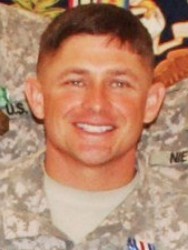

Synopsis:
The President of the United States of America, authorized by Act of Congress July 9, 1918 (amended by an act of July 25, 1963), takes pleasure in presenting the Silver Star to Sergeant First Class Kristopher C. Verrett, United States Army, for exceptional gallantry in action against an enemy of the United States as a Platoon Sergeant of 2d Platoon, Company B, 1st Battalion, 27th Infantry Regiment, 2d Brigade Combat Team, United States Division-North, Tikrit, Iraq, on 7 September 2010 during Operation NEW DAWN. Sergeant First Class Verrett's actions are in keeping with the finest traditions of military service and reflect distinct credit upon himself, the United States Division-North, and the United States Army.


Synopsis:
The President of the United States takes pleasure in presenting the Silver Star Medal to Justin Viene, Staff Sergeant, U.S. Army, for conspicuous gallantry and intrepidity in action while serving with as a Squad Leader with the 2d Battalion, 75th Infantry Regiment (Ranger), during combat operations in support of Operation ENDURING FREEDOM in Afghanistan. During 2004, while on patrol near the Pakistani border, Staff Sergeant Viene's squad was ambushed by enemy forces with mortars and rocket propelled grenades. While one of the other squad leaders established a base of fire and initiated radio communications to report the critical situation, heedless of the deadly fire, Staff Sergeant Viene led two of his men up a hill to rout the enemy with a squad automatic weapon.
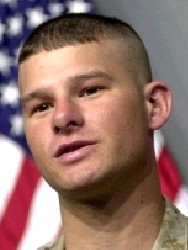

Synopsis:
The President of the United States of America, authorized by Act of Congress July 9, 1918 (amended by an act of July 25, 1963), takes pleasure in presenting the Silver Star to Staff Sergeant Jamie A. Villafane, United States Army, for conspicuous gallantry and intrepidity in connection with military operations against an armed hostile force while serving with Headquarters and Headquarters Company, 1st Battalion, 30th Infantry Regiment, 3d Infantry Division, in support of Operation IRAQI FREEDOM in Iraq, on 21 March 2003. Staff Sergeant Villafane's gallant actions and dedicated devotion to duty, without regard for his own life, were in keeping with the highest traditions of military service and reflect great credit upon himself, the 3d Infantry Division, and the United States Army.
Home Town: Brentwood, Long Island, New York


Synopsis:
The President of the United States takes pleasure in presenting the Silver Star Medal to Gary Villalobos, Sergeant First Class, U.S. Army, for conspicuous gallantry and intrepidity in action while serving with Troop F, 2d Squadron, 3d Armored Cavalry Regiment, during combat operations in support of Operation IRAQI FREEDOM, on 7 June 2005, in Iraq. During a squadron operation in Tal Afar, Iraq, Sergeant First Class Villalobos was tasked to follow and assist an Iraqi Army platoon and two members of the 1st Brigade Military Transition Team, one of whom was Lieutenant Colonel Terrence Crowe. After the first member of the team was injured during a raid on the platoon's first target, Villalobos, Crowe and the Iraqi soldiers came under heavy attack from hand grenades, an improvised explosive device, rocket propelled grenades and machine gun fire. Both Sergeant Villalobos and Colonel Crowe maneuvered down an alleyway where five insurgents ambushed the squad. All but two of the Iraqi Army Soldiers retreated, leaving the two Americans cut off. Colonel Crowe was hit numerous times in the lower abdomen, and fell to the ground 10 feet in front of Sergeant Villalobos, who reported the downed officer and returned fire. He called for armor support and killed at least one insurgent with a grenade. Rather than leave his fallen comrade, Sergeant Villalobos risked his life to evacuate Colonel Crowe to a Bradley Fighting Vehicle, preventing insurgents from capturing his body.
Home Town: Santa Maria, California


Synopsis:
The President of the United States takes pride in presenting the Silver Star Medal (Posthumously) to Thomas E. Vitagliano, Staff Sergeant, U.S. Army, for conspicuous gallantry and intrepidity in action while serving with Company C, 1st Battalion, 503d Infantry Regiment, 2d Brigade Combat Team, 2d Infantry Division, during combat operations in support of Operation IRAQI FREEDOM, on 17 January 2005, in Iraq. On that date, Staff Sergeant Vitagliano , led a squad of 5th Platoon, Company C soldiers on a patrol of the Slawa Market in Ramadi. While the platoon talked with shopkeepers and residents, Staff Sergeant Vitagliano and his squad set up a security perimeter on the west side of the market. Just before noon, a company after-action report reads, the platoon was hit with machine-gun and rocket-propelled grenade fire. During the firefight, an orange-and-white taxi approached Staff Sergeant Vitagliano's team. He and another soldier forced the car to a halt and ordered its occupants out. The passenger got out, but the driver refused. Staff Sergeant Vitagliano saw the driver make strange movements; immediately the troops thought the car was rigged to explode. Staff Sergeant Vitagliano placed himself between the vehicle and another soldier by pushing him out of the way of the vehicle. As the vehicle detonated, Staff Sergeant Vitagliano was killed instantly. Two other soldiers also were killed, but the soldier Staff Sergeant Vitagliano pushed out of the way survived with wounds and internal bleeding.
Home Town: New Haven, Connecticut
Personal Awards: Silver Star (War on Terrorism), Purple Heart
VO, DIEM T.
Citation:
The President of the United States of America, authorized by Act of Congress July 9, 1918 (amended by an act of July 25, 1963), takes pleasure in presenting the Silver Star to Second Lieutenant (Infantry) Diem Tan Vo, United States Army, for exceptionally valorous service while serving with Company A, 1st Battalion, 36th Infantry Regiment, 1st Armored Division, in action on 27 September 2006, in support of Operation IRAQI FREEDOM at Camp Hit, Iraq. Lieutenant Vo's heroic actions during combat operations in Iraq contributed to the overwhelming success of the command's mission. His bravery is in keeping with the finest traditions of military heroism and reflects distinct credit upon himself, the Ready First Combat Team, and the United States Army. NARRATIVE TO ACCOMPANY AWARD: Second Lieutenant Diem Tan Vo heroically distinguished himself by exceptionally valorous conduct in the face of the enemy of the United States as a Platoon Leader for Company A, 1st Battalion, 36th Infantry Regiment, 1st Armored Division, Camp Hit, Iraq, on 27 September 2006 during Operation IRAQI FREEDOM. On 27 September 2006, A/1-26 IN was attacked by mortar fire and small arms fire at Combat Outpost THREE (COP 3) in Hit, Iraq, in Al Anbar Province. An element from A/1-36 IN under the leadership of Second Lieutenant Diem Vo responded to the attack pursuing the enemy into the city. While in a "Troops in Contact" (TIC) air on station spotted two insurgents preparing for a mortar attack at the intersection of Plaintain and Eucalyptus streets. The insurgents conducted a successful mortar attack on a Bradley Fighting Vehicle from A/1-36, resulting in one wounded Soldier. Aircraft followed the mortarmen's vehicle to a house in the local area. Second Lieutenant Vo's patrol was then dispatched to the suspected house to detain the individuals. Once they arrive on site, the patrol came under sporadic small arms fire, but was able to gain entry into the house and detain the suspected individuals. The Company Commander, First Sergeant and Company FSO arrived on the scene to assume command of the situation. Captain Stainbrook directed another section to move one Bradley Fighting Vehicle to his location to assist with recovery operations. Additionally, Second Lieutenant Vo's BFV was also dispatched to assist with security. Captain Stainbrook, First Sergeant Sapp, and Second Lieutenant Jackson dismounted the HMMWV and assumed security positions while the driver, Private First Class Walker and another Soldier proceeded to hook up a tow cable to pull the HMMWV free. As the HMMWV was freed from the mud, the two Soldiers moved to unhook the HMMWV. At that time, the entire element came under heavy machine gun fire from two enemy machine guns located in a building approximately 150 meters to their southeast. All elements on the ground immediately returned fire. First Sergeant Sapp and Captain Stainbrook were hit and severely wounded with debilitating wounds. Second Lieutenant Jackson moved to administer first aid to First Sergeant Sapp, Second Lieutenant Vo immediately directed his BFV to return fire at the source of the fire. Now realizing that First Sergeant Sapp was incapacitated, Second Lieutenant Vo exited his vehicle with his medic, Specialist Sparkman, and ran under fire to the First Sergeant. Still under heavy fire, Second Lieutenant Vo assisted Specialist Sparkman and Second Lieutenant Jackson in moving First Sergeant Sapp to a nearby BFV. While moving First Sergeant Sapp, Second Lieutenant Jackson was wounded a second time. Second Lieutenant Vo, Second Lieutenant Jackson, and Specialist Sparkman continued to move the First Sergeant into the BFV, where Specialist Sparkman administered immediate first aid to stop the bleeding. Second Lieutenant Vo then exited the vehicle and ran back to his own BFV. By this time, two Soldiers had moved Captain Stainbrook to another vehicle for medical evacuation. Second Lieutenant Vo looked over and realized that Captain Stainbrook's weapon was left on the battlefield. Not wanting to give the enemy an opportunity to take a weapon, he ran under fire to retrieve it. After picking up the weapon, he was then hit with machine gun fire and wounded with a gunshot wound to the arm. He proceeded to his own BFV where he received immediate first aid and was evacuated back to the Battalion Aid Station. Second Lieutenant Vo's courage under heavy enemy fire directly contributed to saving the life of First Sergeant Sapp. After assisting with the evacuation of the first sergeant he returned to the field of battle, retrieving Captain Stainbrook's weapon under fire, resulting in his own wounds. His actions are in keeping with the finest traditions of military heroism and reflect great credit upon himself, the Ready First Combat Team, the Multi-National Corps-Iraq, and the United States Army.


Synopsis:
The President of the United States takes pleasure in presenting the Silver Star Medal to Gary Volesky, Lieutenant Colonel, U.S. Army, for conspicuous gallantry and intrepidity in action while Commanding the 2d Battalion, 5th Cavalry Regiment 1st Cavalry Division, during combat operations in support of Operation IRAQI FREEDOM, on 16 August 2004. Lieutenant Colonel Volesky personally led an ad hoc element of two tanks and 11 Bradley Fighting Vehicles to rescue a Bradley Fighting Vehicle section that was isolated and in heavy contact in Sadr City, Iraq. Insurgent RPG gunners had earlier ambushed a tank section. They then ambushed a Bradley Fighting Vehicle when it was dispatched to secure the damaged tank. The 1st Brigade Combat Team's commander directed Task Force Lancer, at the time were refitting and conduction maintenance in preparations for Operation IRON FURY, to mount up immediately and fight its way to the cut-off section. The crew and dismounted section from the stricken Bradley cleared a building and established a defensive position on its rooftop. Sensing the urgency of the situation, Lieutenant Colonel Volesky immediately mounted his Bradley Fighting Vehicle and departed Camp Eagle at the head of the column. While receiving small arms fire, RPGs and detonations from improvised explosive devices along the route, Lieutenant Colonel Volesky continued on and arrived at the site. He secured it and evacuated the wounded. Iraqi police reported that a 500-man Madhi Army strike force was moving in on the location of the ambushed section. After recovering the damaged vehicle, now engulfed in flames, and the wounded, Lieutenant Colonel Volesky called in AH-64 Apache attack helicopters to provide close air support to cover their withdrawal. The rescue resulted in recovery of the damaged vehicles, 100 percent accountability and 10 insurgent fighters killed.
Born: at Spokane, Washington
Home Town: Spokane, Washington


Synopsis:
The President of the United States takes pleasure in presenting the Silver Star Medal to Jude Voss, Staff Sergeant, U.S. Army, for conspicuous gallantry and intrepidity in action while serving with the 1st Battalion, 3d Special Forces Group (Airborne), during combat operations in support of Operation ENDURING FREEDOM, in Afghanistan. Staff Sergeant Voss, a senior engineer sergeant, pulled a soldier out of a burning vehicle in Afghanistan while ammunition exploded all around him. Staff Sergeant Voss received burns on his hands and forearms but was still able to carry the wounded soldier to safety.
Personal Awards: Silver Star (War on Terrorism), Purple Heart
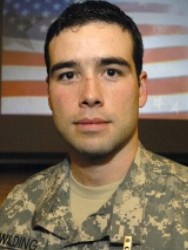

Citation:
The President of the United States of America, authorized by Act of Congress July 9, 1918 (amended by an act of July 25, 1963), takes pleasure in presenting the Silver Star to Staff Sergeant John W. Walding, United States Army, for exceptionally valorous conduct in the face of the enemy of the United States as Communications Sergeant, Operational Detachment Alpha 3336 (ODA-3336), 3d Special Forces Group (Airborne), Special Operations Task Force - 33, Combined Joint Special Operations Task Force - Afghanistan, in support of Operation ENDURING FREEDOM on 6 April 2008. Sergeant Walding heroically distinguished himself during a combined raid against a High Value Target in Shok Valley, Nuristan Province, Afghanistan. With disregard for his own safety, Sergeant Walding fought his way through intense sniper, machine gun, and RPG fire to reinforce his ODA and Afghan Commandos pinned down by effective insurgent fire. Sergeant Walding led an assault element from the ODA and Commandos uphill for over an hour to reach the beleaguered force pinned against a near vertical 60 foot cliff. Undeterred, knowing they had multiple urgent casualties, and in danger of being overrun, Sergeant Walding led a courageous attack five hundred meters up treacherous terrain, braving danger close air strikes to reinforce the most forward position. After moving forward under Insurgent fire for more than an hour and killing multiple insurgents, he finally reached the besieged element, and began to organize Commandos to evacuate casualties. His heroic actions and leadership under the worst of circumstances motivated his Commandos, and his team mates to fight on as they faced nearly two hundred well trained insurgents, during the six and a half hour gun battle. As Sergeant Walding suppressed Insurgent positions, in order to protect his fallen comrades, he was shot in the lower right leg by sniper fire, effectively amputating his leg below the knee. Despite receiving a life threatening amputation of his leg, Sergeant Walding continued to suppress Insurgent positions in order to defend his comrades. His heroic actions and determination in the face of extreme pain inspired the entire assault force. His actions are in keeping with the finest traditions of military heroism and reflect distinct credit upon himself, Special Operations Task Force - 33, Combined Joint Special Operations Task Force - Afghanistan, Special Operations Command Central and the United States Army.
Home Town: Groesbeck, Texas
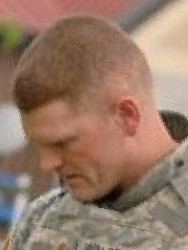

Citation:
The President of the United States of America, authorized by Act of Congress July 9, 1918 (amended by an act of July 25, 1963), takes pleasure in presenting the Silver Star to Captain David Andrew Waldron, United States Army, for conspicuous gallantry and leadership during intense combat operations In Iraq as Commanding Officer of Company B, 64th Armored Regiment, 3d Infantry Division, attached to Task Force 1-15th Infantry, in support of Operation IRAQI FREEDOM in Iraq, in from 21 March to 14 April 2003. Captain Waldron led his company as the lead combat force for the Battalion Task Force in every major attack over the course of three weeks of intense fighting. Despite receiving wounds himself, Captain Waldron continued to fight, lead, and win. His leadership was instrumental in the successful defeat of the Iraqi 11th Division during the first major battle against Iraq. His company led the way during the first attack across the Euphrates River against Iraqi Republican Guard forces in Baghdad. His courage under fire, dedication to duty, and tactical skills define the essence of combat leadership and bring great credit upon himself, the 3d Infantry Division, and the United States Army.
Home Town: Natick, Massachusetts
WALKER, KEVIN R.
Citation:
The President of the United States of America, authorized by Act of Congress July 9, 1918 (amended by an act of July 25, 1963), takes pleasure in presenting the Silver Star to Master Sergeant Kevin R. Walker, United States Army, for conspicuous gallantry and intrepidity in connection with military operations against an armed hostile force in support of Operation ENDURING FREEDOM in Afghanistan, during Operation ANACONDA on 25 February 2002. Master Sergeant Walker and his team achieved operational effects completely out of proportion to the small number of forces committed. The strategic significance of the devastation they delivered to the enemy is insurmountable. His bravery and valor contributed directly to the success of Operation ANACONDA and the lives saved during the mission. His gallant actions and dedicated devotion to duty, without regard for his own life, were in keeping with the highest traditions of military service and reflect great credit upon himself, his unit, and the United States Army.
WALKER, JOSHUA J.
Citation:
The President of the United States takes pleasure in presenting the Silver Star Medal to Joshua J. Walker, Sergeant, U.S. Army, for conspicuous gallantry and intrepidity in action while serving as a Fire Team Leader of Chalk 1, Company A, 1st Battalion, 75th Ranger Regiment, during combat operations in support of Operation ENDURING FREEDOM, during the period 3 to 4 March 2002, during Operation ANACONDA, in Afghanistan. Sergeant Walker's valorous actions while in direct contact with enemy forces and in the face of extreme duress during the successful rescue of Special Operators, contributed immeasurably to the success of the mission and to the saving of additional lives. Sergeant Walker immediately exited the aircraft and destroyed an enemy soldier who was shooting at his aircraft. He was able to suppress the enemy with his M-4 carbine, and M-249 squad automatic weapon, and an M-203 grenade launcher. Sergeant Walker was an integral part of a four-man assault force that moved up a deep slope, in knee-deep snow, through a hail of enemy fire in broad daylight. The gallantry displayed by Sergeant Walker during 18 hours of combat is in keeping with the highest standards of valor. Through his distinctive accomplishments, Sergeant Walker reflected credit upon himself, the United States Army, and the Department of Defense.
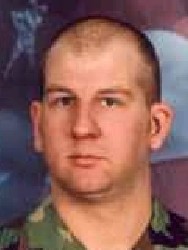

Citation:
The President of the United States of America, authorized by Act of Congress July 9, 1918 (amended by an act of July 25, 1963), takes pride in presenting the Silver Star (Posthumously) to Staff Sergeant Mark Adam Wall, United States Army, for conspicuous gallantry and intrepidity in connection with military operations against an armed hostile force while serving with Company C, 2d Battalion, 1st Infantry Regiment, 172d Stryker Brigade Combat team, at Mosul, Iraq, on 19 November 2005, during military operations in support of Operation IRAQI FREEDOM III. Staff Sergeant Wall's actions are directly responsible for the destruction of a terrorist cell while allowing for the rapid evacuation of his wounded platoon members. Of the 12 casualties sustained, all but one survived their wounds, due in great part to the leadership, courage, and selflessness exhibited by Staff Sergeant Wall that morning. His actions were directly responsible for the destruction of a key terrorist cell, the withdrawal of the trapped assault element, and the rapid evacuation and treatment of his wounded comrades. NARRATIVE TO ACCOMPANY AWARD: At 0450 hours on 19 November 2005, 2d Platoon, Company C, 2-1 Infantry was on patrol in Mosul, Iraq, when they received a report that Iraqi Police had received small arms fire and grenades from a house in the Al Sukar neighborhood. Staff Sergeant Mark Wall, as a squad leader, was on patrol with his platoon when they received the initial report. The platoon immediately responded and moved to the site of the attack. The platoon arrived within several minutes and assessed the situation. As they cordoned the house, the platoon leader instructed 1st and 2d Squads to conduct the initial assault, leaving 3d Squad in reserve. As the stack approached the house, the terrorists within engaged them with a grenade thrown down the central hallway into the doorway. The platoon immediately took a casualty from this grenade. The remainder of the assault element continued through the door to gain a foothold. As they entered the house they encountered heavy small arms fire from seven terrorists executing a prepared defensive plan. The rate of enemy fire in the hallway forced them into a kitchen on the left. The kitchen had two entry/exit points through which the terrorists could engage the trapped squads from prepared firing positions. The assault element continued to take casualties in this room from heavy small arms fire and what they believed to be grenades. It was later found that these grenades were fused 82-mm. mortar rounds with tail sections removed. As the assault element suffered casualties they quickly became combat ineffective. Only two members were not wounded. 3d Squad was unable to enter the building due to the high rate of enemy fire towards both the front door and the door to the kitchen. For this same reason, the assault element was unable to advance further or withdraw. Realizing his element could not withdraw, the 1st Squad Leader advised Staff Sergeant Wall to assault the room across from the kitchen to eliminate enemy fire from that direction. At this time, the C21 Stryker breached the wall of the house into the kitchen to allow for the withdrawal of the squads inside. The vehicle commander and air guard immediately began suppression of the enemy with .50 caliber machine gun and M4 fire, firing directly over the heads of the squads inside and allowing them several critical moments to disengage. Staff Sergeant Wall, seeing the immediacy of the situation, led his assault with grenades, eliminating the enemy threat from the end of the hallway and allowing his squad to enter the house. This was the turning point of the battle and regained the initiative for the platoon. As they moved into the house, Specialist Timothy Stewart received a gunshot wound to the arm. Staff Sergeant Wall responded immediately, engaging and killing the shooter. Once inside, he and his squad entered the kitchen and he began organizing the withdrawal of the casualties to the street. During the course of CASEVAC, Staff Sergeant Wall not only led the evacuation effort within the house, but also organized the security of the operation, and personally carried several casualties to the Strykers, re-entering the house four more times to evacuate casualties, all while under direct fire from the enemy. Of the 12 casualties sustained, all but one survived their wounds, due in great part to the leadership, courage, and selflessness exhibited by Staff Sergeant Wall that morning. His actions were directly responsible for the destruction of a key terrorist cell, the withdrawal of the trapped assault element, and the rapid evacuation and treatment of his wounded comrades.
Home Town: Alden, Iowa
WALTER, CHARLES D.
Synopsis:
The President of the United States of America, authorized by Act of Congress July 9, 1918 (amended by an act of July 25, 1963), takes pleasure in presenting the Silver Star to Master Sergeant Charles D. Walter, United States Army, for conspicuous gallantry and intrepidity in connection with military operations against an armed hostile force while serving in support of Operation ENDURING FREEDOM on 23 August 2005, near Oruzgan, Afghanistan. Master Sergeant Walter's effective decisions enabled his small element of Afghan National Police to a 20-hour initiative over 30 kilometers of impassable terrain at night. His leadership and valor resulted in 18 enemy killed, including the province's chief Taliban commander. Master Sergeant Walter also recovered weapons, radios and critical phone numbers. His gallant actions and dedicated devotion to duty, without regard for his own life, were in keeping with the highest traditions of military service and reflect great credit upon himself, his unit, and the United States Army.


Synopsis:
The President of the United States takes pride in presenting the Silver Star Medal (Posthumously) to Donald Walters, Sergeant, U.S. Army, for conspicuous gallantry and intrepidity in action while serving as a Mechanic with the 507th Maintenance Battalion, 11th Air Defense Artillery Brigade, during combat operations in support of Operation IRAQI FREEDOM, near An Nasiriya, Iraq, on 23 March 2003. On that date a huge American convoy headed from Kuwait to Baghdad. A dozen heavy trucks and other maintenance vehicles fell behind the rest and got lost. At sunrise, Iraqi troops ambushed the lost soldiers, firing from both sides of the highway. The Americans sped up to escape the attack, but one Humvee smashed into the back of a jack-knifed American tractor-trailer. Sergeant Walter's displayed a courage that reflected his gallantry to serve his country and fellow soldiers caught in the ambush.
Home Town: Salem, Oregon
Personal Awards: Silver Star (War on Terrorism), Purple Heart
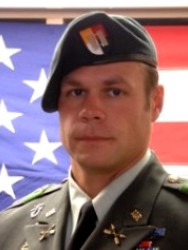

Citation:
The President of the United States of America, authorized by Act of Congress July 9, 1918 (amended by an act of July 25, 1963), takes pleasure in presenting the Silver Star to Captain (Infantry) Kyle M. Walton, United States Army, for exceptionally valorous conduct in the face of the enemy of the United States as Detachment Commander, Operational Detachment Alpha 3336 (ODA-3336), 3d Special Forces Group (Airborne), Special Operations Task Force - 33, Combined Joint Special Operations Task Force - Afghanistan, in support of Operation ENDURING FREEDOM on 6 April 2008. Captain Walton heroically distinguished himself as the Ground Force Commander for two ODAs combat advising a 100 man company of Afghan Commandos into Shok Valley. Their mission was to kill or capture a Joint Priority Effects List target of the Hezebela Islami Gulbadin insurgent group. After inserting via CH-47 into the objective area at nearly ten thousand feet, Captain Walton led his element through a fast moving stream and began the climb up the ice covered mountain toward the objective. Approximately half way up the mountain, the Insurgents engaged all elements simultaneously with a heavy volume of extremely accurate machine gun, sniper, and Rocket Propelled Grenade fire in all directions from the surrounding high ground. Within minutes, one detachment member in the assault force was critically wounded and another at the base of the mountain was also wounded, along with several Afghan Commandos. The detachment interpreter standing next to Captain Walton was shot in the head and died instantly. With total disregard for his own personal safety, Captain Walton exposed himself to deadly fire in order to pull his critically wounded teammate back to a semi-covered position. Although his position was pinned down by heavy Insurgent fire, Captain Walton continued to maintain effective command and control of five different maneuver elements, while repeatedly engaging numerous Insurgent fighting positions. Captain Walton bravely exposed himself to enemy fire several more times in order to pull wounded Americans and Afghans to safety. While pulling casualties to cover, the tip of his rifle barrel was shot off. Knowing his weapon was no longer accurate beyond a short distance, Captain Walton courageously continued to identify targets for other Soldiers to engage despite being impacted by two rounds to his helmet. As the situation deteriorated and the casualties mounted, Captain Walton came to the realization that his entire element was in danger of being completely overrun by Insurgent forces. Captain Walton relayed this information to his headquarters and requested the placement of danger close attack helicopter and fixed wing close air support on all known and suspected Insurgent positions. He authorized the use of 2000 pound bombs to be dropped almost directly on top of his position in order to prevent Insurgent forces from overrunning the American and Afghan elements. His audacious decision allowed just enough freedom of maneuver to evacuate all casualties down a 60 foot cliff in preparation for medical evacuation. Throughout the six and a half hour battle, Captain Walton's unwavering combat leadership and poise under fire inspired all under his command and was directly responsible for saving the lives of US and Afghan Soldiers. His actions are in keeping with the finest traditions of military heroism and reflect distinct credit and upon himself, Special Operations Task Force - 33, the Combined Joint Special Operations Task Force - Afghanistan, Special Operations Command Central and the United States Army.
Home Town: Carmel, Indiana
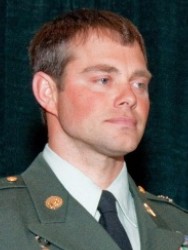

Citation:
The President of the United States of America, authorized by Act of Congress July 9, 1918 (amended by an act of July 25, 1963), takes pleasure in presenting the Silver Star to Sergeant First Class Mark A. Wanner, United States Army, for gallantry in in action on 31 May 2009, while serving as Senior Medical Sergeant, Special Forces Operational Detachment Alpha-9224, Special Operations Task Force-92, in support of Operation ENDURING FREEDOM. After his detachment engaged a numerically superior, heavily armed enemy force, Sergeant First Class Wanner acted with complete disregard for his own personal safety by moving into an exposed position to render emergency aid. After noticing that a teammate was grievously injured and laying perilously close to an enemy position, he crossed open terrain in order to move his follow Soldier closer to safety. After the Soldier collapsed due to the severity of his wounds, Sergeant First Class Wanner refused to abandon his teammate, remaining in the exposed position as enemy fire impacted all around him. Using his own body as a shield to prevent further harm to his fellow Soldier, he coordinated the detachment's suppressing fire until there was enough of a lull in enemy activity to allow him to carry his wounded teammate to the medical evacuation site. His selfless conduct while under heavy enemy fire saved the life of a teammate and is an example for all Soldiers to follow. Sergeant First Class Wanner's heroic actions are in keeping with the finest traditions of military service and reflect great credit upon himself, the Special Operations Command Central, and the United States Army. NARRATIVE TO ACCOMPANY AWARD: Sergeant First Class Mark A. Wanner, United States Army heroically distinguished himself by exceptionally valorous conduct in the face of an enemy of the US as the Senior Medical Sergeant, Gardez Afghanistan, Special Forces Operational Detachment Alpha (ODA) 9224, Special Operations Task Force 92, Bagram Airfield, serving in support of Operation Enduring Freedom on 31 May 2009. During the hours of darkness, in a rural village in Waghez District Sergeant First Class Wanner's ODA and its partnered Afghan Force became heavily engaged, at close range with a numerically superior, heavily armed, Taliban Force. Several members of the partner force were injured by small arms fire before the assault could even begin. Disregarding his own safety, Sergeant First Class Wanner voluntarily left the security of a covered position to render aid. As the assault began ODA Member, Sergeant First Class Sean Clifton was struck by multiple rounds, most grievously in his pelvis and abdomen. He fell within ten feet of the front door to the enemy compound, leaving him lying directly under small arms fire. With further disregard to his safety Sergeant First Class Wanner moved immediately to Sergeant First Class Clifton and dragged him to what was believed to be a covered position. Upon their arrival, however, enemy elements emerged from the north side of the building and began pouring intense, heavy small arms fire into their position. By this point Sergeant First Class Clifton had collapsed. Realizing the gravity of the injuries Sergeant First Class Wanner refused the safety of a more secure position and immediately began medical aid. The enemy was pouring sustained small arms fire directly at the two men. Rounds impacted all around their exposed position, some landing between the legs of Sergeant First Class Wanner. Realizing it was only a matter of seconds before Sergeant First Class Clifton sustained a mortal wound Sergeant First Class Wanner used his body as a shield between the enemy fire and the exposed body of Sergeant First Class Clifton. While doing so he called for his teammates to place suppressive fire on the enemy positions. While simultaneously treating Sergeant First Class Clifton he directed one of his teammates to take a fragmentation grenade from his combat load and throw it into the doorway. As he and Sergeant First Class Clifton remained at danger close range to the fragmentary grenade Sergeant First Class Wanner again shielded Sergeant First Class Clifton with his body as the grenade detonated inside the doorway. This act and the use of crew-served weaponry suppressed enemy fire enough for Sergeant First Class Wanner to carry Sergeant First Class Clifton to the medevac site where Sergeant First Class Wanner was able to load Sergeant First Class Clifton aboard under continuous small arms fire. So fortified was the enemy position that upon the evacuation of the wounded it was destroyed through the use of CAS. Sergeant First Class Wanner's medical care and valorous conduct in using his own body to shield his teammate saved Sergeant First Class Clifton's life. Waking for a brief few minutes on the day after the engagement Sergeant First Class Clifton's first remark was to attribute his very survival to Sergeant First Class Wanner's skill and valor. Sergeant First Class Wanner's actions are in keeping with the finest traditions of military heroism and reflect distinct credit upon himself, Combined Joint Special Operations Task Force - Afghanistan, and the United States Army.
Home Town: North Dakota
WARDLOW, DAVID B.
Citation:
The President of the United States of America, authorized by Act of Congress July 9, 1918 (amended by an act of July 25, 1963), takes pleasure in presenting the Silver Star to Sergeant First Class David B. Wardlow, United States Army, for conspicuous gallantry and intrepidity in action against the enemy while serving with Company C, 1st Battalion, 41st Infantry Regiment, 1st Armored Division, during military operations in Iraq against a hostile force in support of Operation IRAQI FREEDOM. Sergeant First Class Wardlow performed with great valor in the face of enemy fire while serving as a Platoon Sergeant from 5 April 2003 to 6 April 2003. His actions were a direct contribution to the overall success of the 2d Battalion, 70th Armored Regiment and 101st Airborne Division's mission. Sergeant First Class Wardlow brought great credit upon himself, the 101st Airborne Division, and the United States Army. NARRATIVE TO ACCOMPANY AWARD: On 5 April 2003, as the Platoon Sergeant for 1st Platoon, Charlie Company, 1st Battalion, 41st Infantry Regiment, as part of a detached Platoon in support of a Light Infantry Company, Sergeant First Class Wardlow's true warrior spirit and dedication to the mission's success were directly responsible for the capture of Objective INDIA, ALPHA, and JULIET in the city of Karabala. During 1st Platoon's initial operation to gain a foothold for the Bulldog Company, his section and supporting infantry squad came under heavy enemy fire. After receiving reports that the enemy had effectively pinned down first and third squads with one Wounded in Action, he immediately came to the aid of his pinned down men providing them lethal covering fire. Without regard to his own life he quickly positioned his Bradley Fighting Vehicle between the barrage of enemy small arms and his infantry soldiers. During this action his soldiers quickly re-mounted the vehicle with the injured soldier, Specialist Larry Brown. Sergeant First Class Wardlow's actions alone saved the company medics the critical time they needed to provide first aid to Specialist Brown. After ensuring that Specialist Brown was properly evacuated he assembled his Platoon and returned to the fight. His ability to close with and destroy the enemy was critical to the Bulldog Company establishing a foothold inside the city. Sergeant First Class Wardlow was responsible for destroying two enemy gun trucks and 25 paramilitary forces. Upon haring that his platoon leader's track had been hit and there were nine casualties, he immediately took control of the platoon and executed the daring rescue of all of the injured soldiers. He moved forward putting himself in direct contact with enemy RPG and AK-47 fire in an attempt to shield his men on the ground. His selfless act sheltered his men from the deadly shrapnel and 7.62 rounds resulting in no further injuries. His act saved the lives of his men as they fought 800 meters back through the city to the last friendly infantry Strong Point, where he saw to their medical needs. Once again, Sergeant First Class Wardlow returned to the fight ensuring that the Light Infantry Company had the covering fire they needed in order to execute their mission successfully.
WARREN, SCOTT M.
Citation:
The President of the United States of America, authorized by Act of Congress July 9, 1918 (amended by an act of July 25, 1963), takes pleasure in presenting the Silver Star to Sergeant First Class Scott M. Warren, United States Army, for conspicuous gallantry and intrepidity in connection with military operations against an armed hostile force while serving in support of Operation IRAQI FREEDOM in Iraq, on 25 October 2005. On this date, Sergeant First Class Warren and his element conducted an assault against an enemy position. Upon entering the target building, he encountered multiple enemy fighters at close quarters. Realizing that one of them was initiating an explosive vest, rather than seek readily available cover for himself, he engaged the enemy from 5 feet away. Turning away from Sergeant First Class Warren's accurate fire, the enemy fighter activated his explosive vest. The result of his turning away focused the explosive blast and ball bearing shrapnel away from the assault force into the other armed enemy fighters in the room and the load-bearing external walls of the building. Sergeant First Class Warren's gallant actions and dedicated devotion to duty, without regard for his own life, were in keeping with the highest traditions of military service and reflect great credit upon himself, his unit, and the United States Army.


Synopsis:
The President of the United States takes pleasure in presenting the Silver Star Medal to Clinton A. Warrick, Corporal, U.S. Army, for conspicuous gallantry and intrepidity in action while serving as a Combat Medic with the 2d Platoon, 300th Military Police Company, during combat operations in support of Operation IRAQI FREEDOM, on 18 September 2006, in Iraq. On that date U.S. military police and Iraqi policemen were conducting their usual transitional training at the Al Huria police station in Iraq. Suddenly, without warning, small-arms fire erupted from all directions. The base was under siege. Coalition forces concentrated fire on the attackers, but then a speeding pick-up truck crashed through the entrance and careened toward the center of the station. The truck detonated its 200-pound aircraft bomb, throwing Corporal Warrick several meters and knocking him unconscious. Rubble from the explosion buried him. Corporal Warrick's platoon leader saw what happened and quickly pulled him from the debris. Corporal Warrick's legs were on fire so the platoon leader used a fire extinguisher to put out the flames. When Corporal Warrick regained consciousness, he realized that he was badly burned but he also realized that if he sat in one place, he would go into shock. He requested morphine, but his medic bag was buried in the burning building. As a medic, he knew that without pain medication, his only choice to avoid slipping into shock was to stay active. So he climbed through a hole in the building to see how he could assist. With a heavy stream of fire still raining down on the station, and suffering from third-degree burns over 45 percent of his body as well as shrapnel wounds and smoke-inhalation injuries, Corporal Warrick went about the work of a medic: He assessed injured soldiers and Iraqi policemen and told the nearby support battalion what injuries they could expect. That vital information helped save the lives of seven Iraqi policemen. Corporal Warrick realized he couldn't fight off the shock much longer, so he moved to the north side of the station where he could be evacuated to the medical station himself.
Home Town: Murphysboro, Illinois
WATTS, ROGER G.
Synopsis:
The President of the United States takes pleasure in presenting the Silver Star Medal to Roger G. Watts, Sergeant First Class, U.S. Army, for conspicuous gallantry and intrepidity in action while serving as a Medical Sergeant with the 3d Special Forces Group (Airborne), during combat operations in support of Operation IRAQI FREEDOM, at Karabala, Iraq, on 12 May 2004. Sergeant First Class Watts distinguished himself when he saved the lives of two critically injured tank crewman in Iraq when Special Forces soldiers were sent to help a platoon from the 1st Armored Division that had been pinned down by Iraqi insurgents occupying a shrine. Sergeant First Class Watts led his four-man team to the shrine, where there was an intense gun battle. The Special Forces soldiers were able to secure the area, but the insurgents counterattacked several times. Watts saw a tank commander and another crew member get cut down by rocket-propelled grenade and machine gun fire. Sergeant First Class Watts rushed to the tank under intense fire, stabilized the wounded and took command of the tank, directing it to fire on the insurgents. Watts continued to command the tank and care for the wound during several more enemy assaults.
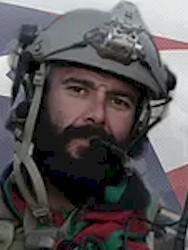

Synopsis:
The President of the United States of America, authorized by Act of Congress July 9, 1918 (amended by an act of July 25, 1963), takes pride in presenting the Silver Star (Posthumously) to Sergeant First Class Andrew Tarrant Weathers, United States Army, for conspicuous gallantry and intrepidity in action against the enemy while serving with Operation Detachment Alpha 7221 (ODA-7221), 2d Battalion, 7th Special Forces Group (Airborne), in support of Operation ENDURING FREEDOM in the Gundamreez Bazaar, Kajaki District Helmand Province, Helmand Province, Afghanistan. His gallant actions and dedicated devotion to duty, without regard for his own life, were in keeping with the highest traditions of military service and reflect great credit upon himself, his unit, and the United States Army.
Born: At Crestview, Florida
Home Town: DeRidder, Louisiana
WEBER, STEVEN J.
Citation:
The President of the United States of America, authorized by Act of Congress July 9, 1918 (amended by an act of July 25, 1963), takes pleasure in presenting the Silver Star to Captain Steven J. Weber, United States Army, for gallantry in connection with military operations against an opposing armed force while commanding Headquarters and Headquarters Company, 2d Battalion, 327th Infantry Regiment, 1st Brigade Combat Team, 101st Airborne Division, in action during Operation STRONG EAGLE on 27 - 28 June 2010 in support of Operation ENDURING FREEDOM in Afghanistan. Captain Weber, under seemingly insurmountable conditions of the harshest extremes, was able to inspire the combined combat forces in his formation to persevere and wind under conditions much more favorable to the enemy. His gallant actions and dedicated devotion to duty, without regard for his own life, were in keeping with the highest traditions of military service and reflect great credit upon himself, his unit, and the United States Army.
Home Town: Winthrop, Minnesota
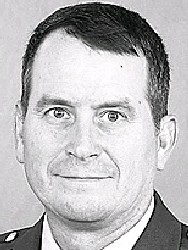

Citation:
The President of the United States of America, authorized by Act of Congress July 9, 1918 (amended by an act of July 25, 1963), takes pride in presenting the Silver Star (Posthumously) to Chief Warrant Officer Five Jamie Dunbar Weeks, United States Army, for conspicuous gallantry and intrepidity in action while serving as an AH-6 pilot with Company B, 1st Battalion, 160th Special Operations Aviation Regiment (Airborne) on 14 May 2006, while operating against an entrenched enemy force during a daylight raid in support of Operation IRAQI FREEDOM. Major Worrell continued to make successive assaults in support of the ground forces, without regard for his own personal safety, until his aircraft was shot down. His actions destroyed several enemy positions, enabling the ground forces to consolidate into defensive positions. Without Major Worrell's courage and gallantry under hostile fire, the ground forces would have sustained significant casualties. He directly contributed to the successful execution of this direct action mission. Major Worrell's distinctive accomplishments are in keeping with the finest traditions of military service and reflect great credit upon himself, this command, and the United States Army.
Born: At Nurnberg, West Germany
Home Town: Daleville, Alabama
WEEKS, MATTHEW H.
Synopsis:
The President of the United States of America, authorized by Act of Congress July 9, 1918 (amended by an act of July 25, 1963), takes pleasure in presenting the Silver Star to Master Sergeant Matthew H. Weeks, United States Army, for conspicuous gallantry and intrepidity in action against the enemy in support of Operation ENDURING FREEDOM in Afghanistan. His gallant actions and dedicated devotion to duty, without regard for his own life, were in keeping with the highest traditions of military service and reflect great credit upon himself, his unit, and the United States Army.
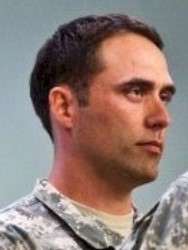

Citation:
The President of the United States of America, authorized by Act of Congress July 9, 1918 (amended by an act of July 25, 1963), takes pleasure in presenting the Silver Star to Sergeant First Class David T. Weigel, United States Army, for gallantry in action on 20 February 2009, while serving as a Weapons Sergeant, Special Forces Operational Detachment Alpha 3123 (ODA-3123), Special Operations Task Force-31, Kandahar Airfield Afghanistan, in support of Operation ENDURING FREEDOM. While conducting a joint reconnaissance mission, the rear Ground Mobility Vehicle in Sergeant First Class Weigel's patrol was struck by an improvised explosive device, initiating an enemy ambush. With complete disregard for his own personal safety, he remained in an exposed position in order to lay suppressing fire on the enemy and allow for his wounded teammates to be moved to safety. Without regard to the continuous secondary explosions from the destroyed vehicles and without cover fire, Sergeant First Class Weigel fought his way to where a wounded Soldier lay and began moving him to a covered position. Ignoring his own wounds, sustained from a shrapnel blast, he carried his teammate back to the command post, where he helped load casualties onto other vehicles. Afterwards, despite being continually engaged by the enemy he refused to abandon the ambush site until all of his teammates had been accounted for. His bravery undoubtedly helped save the lives of both American and Afghan soldiers and serves as an example for all Soldiers to follow. Sergeant First Class Weigel's actions are in keeping with the finest traditions of military service and reflect great credit upon himself, the Special Operations Command Central, and the United States Army.


Citation:
The President of the United States of America, authorized by Act of Congress July 9, 1918 (amended by an act of July 25, 1963), takes pleasure in presenting the Silver Star to Major (Infantry) Christopher B. Wells, United States Army, for gallantry in action while serving with the Operational Detachment Alpha 321 (ODA-321), 1st Battalion, 3d Special Forces Group (Airborne), Joint Special Operations Task Force-Afghanistan, during combat operations in support of Operation ENDURING FREEDOM, from 24 July 2005 to 25 July 2005, through unparalleled leadership and valor while engaged in hostile action against anti-coalition forces in the town of Syahcow, Afghanistan, as ground commander of a 285-man combined coalition combat force. Major Wells' innate analytical capacity, decisive leadership, and valor produced mission success and safeguarded the lives of those with him. Captain Well's gallantry under relentless enemy fire led to the coordinated destruction of a numerically superior, well entrenched, and aggressive enemy. His ability to set the conditions necessary for initiating this operation and flawlessly managing its complexities stand as a hallmark of excellence for all Special Forces officers. Captain Wells' performance is in keeping with the finest traditions of military service and reflects great credit upon himself, 1st Battalion, 3d Special Forces Group (Airborne), Combined Joint Task Force 76, and the United States Army. NARRATIVE TO ACCOMPANY AWARD: Major Christopher Wells distinguished himself by exceptional gallantry in action under intense small arms and heavy weapons fire against a well entrenched and numerically superior enemy as the Commander Joint Special Operations Task Force-Afghanistan, Operational Detachment Alpha 321 (ODA-321), 1st Battalion, 3d Special Forces Group (Airborne), in the village of Saco, Oruzgan Province, Islamic Republic of Afghanistan on 25 July 2005. Captain Wells as the commander of an armed reconnaissance of the town of Syahcow, while moving to secure an overlook north of the village came under intense SPG-9 Rocket, 82-mm. Mortar RPG, PKM, and AK-47 fire. Once his element secured the northern overlook, he immediately ordered the suppression of a ridgeline west of the village. As Rocket Propelled Grenades airburst in front of his position and under intense PKM machinegun fire, Captain Wells immediately notified his higher headquarters of the situation and requested Emergency Close Air Support (ECAS) and the Quick Reaction Forces (QRF). Captain Wells realized he had an element pinned down west of the objective on a small hilltop. Without hesitation, he ordered his weapons sergeant to employ the 60-mm. mortar and focus its fires on the heaviest source of enemy fire. Once emplaced, Captain Wells gave adjustments to the mortar gunner, devastating enemy positions within the town and on the western ridgeline. Exposed to heavy enemy fire, Captain Wells without regard for his own personal safety continually gave direction to each maneuvering element in the clearing compounds. Throughout the battle, Captain Wells continued to fight from his vehicle and on the ground, repeatedly exposing himself to hostile enemy fire. Once fixed wing ECAS arrived on station, Captain Wells began air to ground coordination to drop ordinance on the enemy, while avoiding friendly locations. At this point in the battle his vehicle began receiving heavy SPG-9, KPM, and mortar fire from the western ridgeline yet he continued to maintain his position in order to continue directions CAS. AH-64 support arrived on station and he immediately coordinated with the Apaches to destroy the source of the rocket fire. He then began to talk the on station air support onto targets in the town, placing devastating fires on the enemy to include one Joint Direct Attack Munitions (JDAM) used to destroy insurgents firing from a cave complex. Captain Wells then moved from his position, again exposing himself to enemy machinegun fire in order to retrieve a wounded Afghan soldier. He then placed the wounded soldier on a QRF aircraft departing the area. At this point Captain Wells moved the command vehicle to an over watch position to the south of the objective. Once there, Captain Wells came under PKM and AK-47 fire emanating from the town. Without delay, he began spotting enemy positions, so he could bring Apache and GMV firepower against the insurgents. For a second time, Captain Wells exposed himself to enemy fire to retrieve a second Afghan soldier who had been headshot during the fight, the soldier survived and later returned to service. Throughout the battle, Captain Wells de-conflicted the intricate airspace between fixed wing CAS, rotary wing CAS, MEDEVAC aircraft, QRF aircraft, and mortars; without the assistance of a JTAC. Additionally, Captain Wells prevented the drop of ordinance on friendly locations on three different occasions, when elements not organic to his unit gave wrong targeting information to aircraft while attempting to target ACM in close proximity to friendly troops. Captain Well's gallantry under fire throughout the 14-hour battle in 115+ degree temperatures was critical to mission's success and saved the lives of U.S. and Coalition personnel. During the course of the battle he constantly provided calm leadership, direction, and motivation to his U.S. and Afghan soldiers. His efforts contributed to fifteen confirmed enemy KIAs/50 unconfirmed KIA, the capture of fourteen insurgents, and the recovery of over thirty light and heavy weapons. Captain Well's selfless acts of heroism, disregard for his own personal safety, and dedication to duty, reflect great credit upon himself, the 3d Special Forces Group, the Combined Joint Special Operations Task Force-Afghanistan, and the United States Army.
Home Town: San Antonio, Texas
Personal Awards: Silver Star (War on Terrorism), 4@ Bronze Stars, 2@ Army commendation Medals
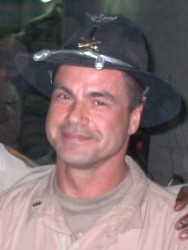

Citation:
The President of the United States of America, authorized by Act of Congress July 9, 1918 (amended by an act of July 25, 1963), takes pleasure in presenting the Silver Star to Chief Warrant Officer Three (CWO-3) Steven Tamsi Wells, United States Army, for conspicuous gallantry and intrepidity in action against the enemy while serving with Troop E, 7th Cavalry Regiment, 4th Brigade Combat Team, 1st Cavalry Division, in the face of an enemy attack on 8 August 2004, at Sadr City, Baghdad, Iraq. Chief Warrant Officer Three Wells provided the downed aircrew with direction, leadership, suppressive fire, and an attempt at extractions. He put himself in extreme danger and personified the tenets of the Soldier's Creed and the Army Values. Chief Warrant Officer Three Wells' actions represent the finest traditions of the Military and reflect highly upon himself, 1st Cavalry Division, Multi-National Corps Iraq, and the United States Army. NARRATIVE TO ACCOMPANY AWARD: Chief Warrant Officer Three Steven T. Wells is recommended for the Silver Star for his conspicuous gallantry on 8 August 2004, as he attempted the rescue of his wingman after they were shot down in Sadr City, Iraq. On 8 August 2004, Chief Warrant Officer Three Wells and his team were conducting reconnaissance in and around Sadr City when his sister ship, BOUNTYHUNGER 13 was struck with an RPG and executed a hard landing on the north west side of Sadr City, Baghdad. After determining that the crew had crashed, and while the downed crew was still trying to extract itself from the inverted aircraft under fire, Chief Warrant Officer Three Wells immediately maneuvered back to the center of the air and ground ambush to determine the status of the crew. While in the process of this action, their crew received heavy small arms, machine gun, and RPG fire and witnessed several enemy RPG and small arms gunners approaching the aircraft. Without hesitation, Chief Warrant Officer Three Steve Wells made an immediate engagement from an altitude of less than 200 feet on a rooftop RPG team who was within 70 meters of the crash site. After performing multiple evasive maneuvers to avoid the heavy volume of enemy fire, Chief Warrant Officer Three Wells returned again to determine the status of the downed aircrew and in the process noticed a large group of personnel approaching from the southeast at a distance of roughly four city blocks. Knowing that the aircrew was still trying to make their way to friendly forces, Chief Warrant Officer Three Wells made an engagement with several rockets between the crash site and the group of Iraqi personnel, preventing them from advancing any further north. While still under heavy fire, Chief Warrant Officer Three Wells made two low level orbits of the area at approximately 30 feet above the city and gained visual contact with the egressing aircrew, and provided hand and arm signals to direct the downed crew toward friendly elements. During this maneuvering, Chief Warrant Officer Three Wells once gain observed armed enemy with small arms and RPG weapons advancing towards the downed aircrew, this time from the northeast. Chief Warrant Officer Three Wells immediately executed two separate close combat attacks and expended all of his remaining rockets in the advancing formation. This action allowed the downed aircrew to move past a mosque and to the vicinity of a large truck on route GRIZZLIES, north of the crash site. Making the determination that the downed crew's only immediate recovery option was through self extraction, Chief Warrant Officer Wells made an attempt to land at the pilot's last known location south of GRIZZLIES and provide them their only means for extraction. Under continuous fire, Chief Warrant Officer Three Wells made two initial attempts to land, both times having to break off due to power lines and obstacles that prevented the aircraft from touching down. Continuing to believe that the aircrew's only attempt at recovery was through self-extraction, chief Warrant Officer Three Wells made an extremely dangerous, near vertical autorotation descent into the city, narrowly avoiding wires and buildings landing adjacent to Route GRIZZLIES. The area in which Chief Warrant Officer Three Wells landed the aircraft was less than ten feet on either side of his rotor disc for clearance of obstacles. While on the ground, the aircraft came under fire from small arms and one RPG round before they could determine that the downed pilots had moved beyond the immediate crash site to the north. Bringing the aircraft to it's power limits, Chief Warrant Officer Three Wells made a vertical ascent and resumed an orbit of the crash site to regain visual contact with the downed crew. On takeoff, chief Warrant Officer Three Wells observed to armed Mahdi's militiamen advancing northward and his co-pilot used an M-4 carbine to engage the enemy from their aircraft. Chief Warrant Officer Three Wells remained on station for another twenty minutes without ammunition and dwindling fuel attempting to provide reconnaissance and security to both the downed pilots and the advancing friendly forces. During this time, observers from Task Force LANCER (2-5 CAV) witnessed at least six more RPG's fired in the maneuvering aircraft's direction, in addition to continuous small arms fire that saturated the airspace. At approximately 1000 hours, Chief Warrant Officer Wells was relieved by two additional aircraft from Strike Battalion, and diverted to land at LX WASHINGTON, unable to return to base with their remaining fuel. Shortly after 1000 hours, the downed aircrew reached friendly forces and was successfully evacuated back to medical facilities. The actions of Chief Warrant Officer Three Wells were directly responsible for the safe recovery of the crew from the downed OH-58D. On three separate occasions, Chief Warrant Officer Three Wells intentionally placed his aircraft directly between enemy fire and the egressing aircrew. His well-aimed fire stopped a crowd of Mahdi Army insurgents from closing on the downed aircraft and drew fire away from the evading pilots. Chief Warrant Officer Three Wells' absolute disregard for his own safety and his willingness to place himself directly in the line of enemy fire to protect other soldiers represents the highest level of gallantry and reflects the greatest credit on himself, Task Force 1-227th Aviation Regiment, the Fourth Brigade, First Cavalry Division, Multi-National Corps-Iraq and the United States Army.
Home Town: Lampasas, Texas
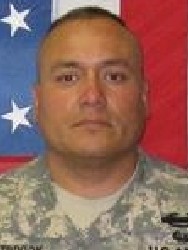

Synopsis:
The President of the United States of America, authorized by Act of Congress July 9, 1918 (amended by an act of July 25, 1963), takes pride in presenting the Silver Star (Posthumously) to Sergeant First Class Kenneth W. Westbrook, United States Army, for conspicuous gallantry and intrepidity in connection with military operations against the enemy while serving with the 1st Brigade, 1st Infantry Division, in action in the Ganjgal Valley, Afghanistan, on 8 September 2009, in support of Operation ENDURING FREEDOM in Afghanistan. His gallant actions and dedicated devotion to duty, without regard for his own life, were in keeping with the highest traditions of military service and reflect great credit upon himself, his unit, and the United States Army.
Born: At Fort Riley, Kansas
Home Town: Shiprock, New Mexico
WESTMORELAND, TED C.
Citation:
The President of the United States of America, authorized by Act of Congress July 9, 1918 (amended by an act of July 25, 1963), takes pleasure in presenting the Silver Star to Master Sergeant Ted Carson Westmoreland, II, United States Army, for gallantry in action against an armed enemy of the United States from 4 December 2001 to 11 December 2001 as Assault Troop Medic, Operational Detachment - Delta, 1st Special Forces during combat operations in support of Operation ENDURING FREEDOM in Afghanistan. Master Sergeant Westmoreland's contributions directly credited this Nation with unequivocal success during a catastrophic mass casualty incident. He is credited for saving numerous lives, both American and indigenous personnel, and performed flawlessly during this strategic mission behind enemy lines. Master Sergeant Westmoreland completed his tasks to perfection despite being wounded and under enemy ground fire that engaged the force. Through his distinctive accomplishments, Master Sergeant Westmoreland reflected great credit upon himself, the United States Army, and the Department of Defense.
WHEATLEY, JOHN P.
Synopsis:
The President of the United States of America, authorized by Act of Congress July 9, 1918 (amended by an act of July 25, 1963), takes pleasure in presenting the Silver Star to Sergeant First Class John P. Wheatley, United States Army, for conspicuous gallantry and intrepidity in connection with military operations against an armed hostile force while serving with Troop A, 3d Battalion, 7th Cavalry Regiment, 3d Infantry Division, in support of Operation IRAQI FREEDOM in Iraq in March/April 2003. Sergeant First Class Wheatley's gallant actions and dedicated devotion to duty, without regard for his own life, were in keeping with the highest traditions of military service and reflect great credit upon himself, the 3d Infantry Division, and the United States Army.
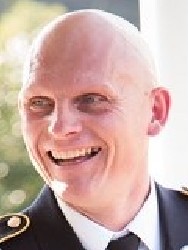

Citation:
The President of the United States of America, authorized by Act of Congress July 9, 1918 (amended by an act of July 25, 1963), takes pride in presenting the Silver Star (Posthumously) to Master Sergeant Joshua Lloyd Wheeler, United States Army, for conspicuous gallantry and intrepidity in action while serving as a Delta Force Operator, in action on 22 October 2015 during combat operations against an armed enemy of the United States as a Team Leader for a Joint Task Force in support of Operation INHERENT RESOLVE. On multiple occasions, Master Sergeant Wheeler fearlessly exposed himself to heavy small arms fire from barricaded enemy positions. His selfless actions were critical in achieving the initiative during the most dangerous portion of the raid. Master Sergeant Wheeler's actions saved the lives of the partner force. Master Sergeant Wheeler's distinctive accomplishments are in keeping with the finest traditions of military service and reflect great credit upon himself, this Command, and the United States Army.
Born: At Roland, Oklahoma
Home Town: Roland, Oklahoma
WHETSTONE, MICHAEL L.
Synopsis:
The President of the United States of America, authorized by Act of Congress July 9, 1918 (amended by an act of July 25, 1963), takes pleasure in presenting the Silver Star to Lieutenant Colonel Michael Lance Whetstone, United States Army, for conspicuous gallantry and intrepidity in connection with military operations against an armed hostile force while serving in support of Operation IRAQI FREEDOM in Iraq. Lieutenant Colonel Whetstone's gallant actions and dedicated devotion to duty, without regard for his own life, were in keeping with the highest traditions of military service and reflect great credit upon himself, his unit, and the United States Army.
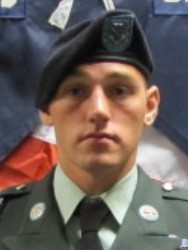

Citation:
The President of the United States of America, authorized by Act of Congress July 9, 1918 (amended by an act of July 25, 1963), takes pleasure in presenting the Silver Star to Sergeant Jacob Wilder, United States Army, for gallantry in action while serving with the 1st Battalion, 506th Infantry Regiment, 4th Brigade Combat Team, 101st Airborne Division, on 22 April 2011 in support of Operation ENDURING FREEDOM in Afghanistan. NARRATIVE TO ACCOMPANY AWARD: Specialist Jacob Wilder distinguished himself through marked heroism and gallantry at the risk of his life in action against an enemy of the United States as an Assistant Scout Team Leader for Scout Platoon, 1st Battalion, 506th Infantry Regiment, 4th Brigade Combat Team, 101st Airborne Division (Air Assault). On the night of 22 April 2011, Specialist Wilder was a member of Assault Team One during a Task Force CURRAHEE Focused Targeting Force, Air Assault raid to neutralize an insurgent weapons cache in Menjo Kala, Yahya Khel District, Paktika Province, Afghanistan, as part of Operation OPEN SEASON. During the operation, Dealer 3-6's western blocking position (BP) came under intense enemy fire from small arms, rocket-propelled grenade, hand grenades, and sustained casualties. Specialist Wilder was on the primary objective when the BP received their casualties, and was instructed to prepare for movement by his team leader. As his element moved to the sound of contact to reach the kill zone, Specialist Wilder laid suppressive fire on the Mosque where a well-armed and determined enemy squad was waging a fight to the death. Specialist Wilder's team cleared a structure to provide cover for the casualties. From the roof of the structure, Specialist Wilder and his team successfully identified friendly casualty locations in the midst of continuing enemy fire. Given the option to stay and suppress or join the rescue team, fully understanding the risks of moving directly into heavy enemy fire and with complete disregard for his own safety, Specialist Wilder chose to enter the kill zone to rescue the wounded American and Afghan Soldiers. Specialist Wilder and his team sprinted 40 meters into the kill zone under continuous enemy PKM, AK-47 and AK-74 fire as friendly elements fired less than two meters over their heads, to recover Specialist Mendes and an Afghan Army casualty. Specialist Wilder faced enemy positions at a range of less than 10 meters to provide continuous covering fire as Staff Sergeant Garcia and Specialist Stone carried two casualties to safety. After moving the two casualties to safety, Specialist Wilder again entered the kill zone under enemy fire to retrieve Sergeant Castro, who was no more than two meters from the enemy position. Specialist Wilder and Staff Sergeant Garcia moved directly to Sergeant Castro's location and carried him to safety while Specialist Stone suppressed the enemy position. As Specialist Wilder evacuated Sergeant Castro, a grenade detonated and wounded him. Despite his wounds, Specialist Wilder immediately rejoined the fight and cleared an adjacent qalat to bring Dealer 3-6 to safety. On this night, Specialist Wilder voluntarily entered the kill zone under fire on two consecutive occasions to assist wounded comrades. With exceptional gallantry under fire, Specialist Wilder was instrumental in retrieving isolated casualties, as well as saving the lives of his American and Afghan comrades. Specialist Wilder's actions are in keeping with the finest military traditions and reflect distinct credit upon himself, this Command, and the United States Army.
WILLIAMS, MATTHEW O.
Citation:
The President of the United States of America, authorized by Act of Congress July 9, 1918 (amended by an act of July 25, 1963), takes pleasure in presenting the Silver Star to Sergeant Matthew O. Williams, United States Army, for exceptionally valorous conduct in the face of the enemy of the United States as Weapons Sergeant, Operational Detachment Alpha 3336 (ODA-3336), 3d Special Forces Group (Airborne), Special Operations Task Force - 33, Combined Joint Special Operations Task Force - Afghanistan, in support of Operation ENDURING FREEDOM on 6 April 2008. Sergeant Williams heroically fought for over an hour up a mountain while under intense enemy fire to help rescue wounded members of his ODA pinned down by Insurgent fire. Sergeant Williams was pinned down in a wadi by heavy sniper, Rocket Propelled Grenade, and machine gun fire after initial contact, as the ODA Command and Control (C2) element was fixed by multiple Insurgent firing positions on the mountain. Sergeant Williams, recognizing the gravity of the situation, heroically and with disregard for his own safety, exposed himself to Insurgent fire on multiple occasions to rescue the C2 element and evacuate numerous casualties. Sergeant Williams helped organize a counter assault to ascend up the mountain and reinforce his besieged teammates. With RPG and machine gun fire impacting all around his element, Sergeant Williams led a Commando element across a fast-moving, ice cold and waist deep river, in order to fight their way up a terraced mountain to the besieged element. After fighting his way with his Team Sergeant up to the C2 element, Sergeant Williams positioned his Afghan Commando to provide a violent base of suppressive fire. This violent base of fire ensured the C2 element was not overrun by assaulting Insurgent fighters. His actions allowed the assault and C2 elements to consolidate and move their causalities down the mountain. After his Team Sergeant was wounded by sniper fire, and with disregard for his own safety, Sergeant Williams courageously maneuvered through a gauntlet of heavy machine gun fire to render aid. While under Insurgent sniper and machine gun fire, Sergeant Williams descended with his Team Sergeant off a 60 foot near vertical cliff to the Casualty Collection Point (CCP) and continued providing him first aid. Sergeant Williams observed, shot and killed two Insurgent fighters attempting to maneuver on the CCP. Sergeant Williams then braved a hail of small arms fire and climbed back up to the cliff in order evacuate other injured Soldiers, and repair his ODA Commander's radio. After returning to the CCP with three wounded US Soldiers, Insurgent fighters began maneuvering to overrun the CCP for the second time. Sergeant Williams and the Afghan Commandos launched a counter attack and gallantly fought for several hours against at least two hundred Insurgents. With disregard for his personal safety, he exposed himself to Insurgent fire from multiple directions and carried casualties to the Medical Evacuation helicopter, then continued to suppress numerous Insurgent positions and direct Commando fires. His valorous actions allowed the patrol to MEDEVAC the wounded and dead comrades without further casualties. His actions are in keeping with the finest traditions of military heroism and reflect distinct credit upon himself, Special Operations Task Force - 33, The Combined Joint Special Operations Task Force - Afghanistan, Special Operations Command Central, and the United States Army.
WILLIAMS, PATRICK C.
Citation:
The President of the United States of America, authorized by Act of Congress July 9, 1918 (amended by an act of July 25, 1963), takes pleasure in presenting the Silver Star to Captain Patrick Charles Williams, United States Army, for conspicuous gallantry and intrepidity as a Physician's Assistant on 31 August 2005, during military operations in support of Operation IRAQI FREEDOM III. Captain Williams' courage and disregard for his own welfare resulted in saving the life of a fellow comrade who was severely wounded. His bravery is in keeping with the finest traditions of military heroism and reflect distinct credit upon himself, 4th Battalion, 23d Infantry Regiment, Multi-National Corps Iraq, and the United States Army. NARRATIVE TO ACCOMPANY AWARD: After spending just twenty-four hours on the ground prior to the combat reconnaissance patrol, Captain Patrick Williams volunteered to accompany soldiers from HHC 1-5 IN. With very little time to acclimatize, Captain Patrick Williams immediately chose to take part in the combat patrol and provide additional medical support. This decision would directly result in saving Staff Sergeant Nicholas Malich's life. On 31 August 2005, the reconnaissance platoon from 1st Battalion, 5th Infantry Regiment, conducted an electronic reconnaissance patrol in the Intesar neighborhood in Mosul. During the patrol, the platoon leader, Lieutenant Scott Brandt received intelligence that a High Value Target (HVT) was in battalion area of operations. Upon locating the possible target house, the platoon, as well as Captain Patrick Williams dismounted to cordon off the objective area. As the platoon moved toward the entrance of the building, two AIF tossed grenades down the stairway at the squad entering the house. Simultaneously Staff Sergeant Malich's squad was hit by automatic PKC fire from an elevated position causing life threatening wounds to Staff Sergeant Malich's pectoral muscle and shoulder. Upon hearing the calls for help, Captain Williams moved to the entrance of the courtyard and immediately administered first aid. While treating Staff Sergeant Malich, Captain Williams and the rescue team were again engaged by the enemy with light machine gun weapons that impacted within a few feet of the rescue. Captain Williams immediately covered Staff Sergeant Malich's body to shield him from the incoming fire while maintaining pressure on his wound. The platoon medic was shot in the right arm during this engagement leaving Captain Williams as the only medical personnel on the objective. During his initial treatment of Staff Sergeant Malich, Captain Williams realized that he could not get to the artery in order to stop the bleeding. While the rescue team maintained suppressive fire, Captain Williams made a three inch incision above the wound to locate the artery. Captain Williams' split second decision to make a larger incision was successful enough to allow four fingers inside which in turn stopped the bleeding. Captain Patrick Williams held the artery closed during the entire evacuation process which lasted 30 minutes. If it were not for Captain Patrick Williams' quick action, Staff Sergeant Malich would have bled to death in a short amount of time due to the large volume of blood he had lost prior to being treated. During the evacuation of one litter urgent patient and one walking wounded, Captain Williams provided simultaneous medical care in the back of a Stryker on the move. While continuing to maintain pressure on Staff Sergeant Malich's artery, Captain Williams barked out instructions to the team concerning the care of Specialist Alvarez who was wounded in the army. Captain Patrick Williams maintained pressure on the wound throughout the entire transfer from the Stryker to the operating table. The 228th CSH on call surgeon stated that if it was not for his quick thinking and innovative techniques, there was no way Staff Sergeant Malich would have survived much less been able to keep his arm. Captain Williams' courage under fire and quick thinking directly contributed to saving the life of Staff Sergeant Nicholas Malich. His actions truly represent the highest degree of valor and reflect great credit upon himself, the 4th Battalion, 23d Infantry Regiment and the United States Army.
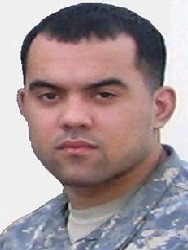

*WILLIS, TRACY C. (KIA)
Synopsis:
The President of the United States of America, authorized by Act of Congress July 9, 1918 (amended by an act of July 25, 1963), takes pride in presenting the Silver Star (Posthumously) to Specialist Tracy C. Willis, United States Army, for conspicuous gallantry and intrepidity in connection with military operations against an armed hostile force while serving with the 2d Battalion, 505th Parachute Infantry Regiment, 3d Brigade Combat Team, 82d Airborne Division, in support of Operation IRAQI FREEDOM in Iraq, on 26 August 2007. Specialist Willis' gallant actions and dedicated devotion to duty, without regard for his own life, were in keeping with the highest traditions of military service and reflect great credit upon himself, the 82d Airborne Division, and the United States Army.
Home Town: Marshall, Texas


Citation:
The President of the United States takes pleasure in presenting the Silver Star Medal to Harper Wilmoth, Staff Sergeant, U.S. Army, for conspicuous gallantry and intrepidity in action while serving as Squad Leader of 2d Squad, Company A, 1st Battalion, 75th Ranger Regiment, during combat operations in support of Operation ENDURING FREEDOM, during the period 3 to 4 March 2002, during Operation ANACONDA, in Afghanistan. Staff Sergeant Wilmoth's valorous actions while in direct contact with enemy forces and in the face of extreme duress during the successful rescue of Special Operators contributed immeasurably to the success of the mission and to the saving of additional lives. Staff Sergeant Wilmoth coordinated the linkup with Chalk 1 over arduous terrain, at an extremely high altitude, and under enemy direct and indirect fire. After the linkup, Staff Sergeant Wilmoth organized the assault on an enemy fortified position. The gallantry displayed by Staff Sergeant Wilmoth during 18 hours of combat is in keeping with the highest standards of valor. Through his distinctive accomplishments, Staff Sergeant Wilmoth reflected credit upon himself, the United States Army, and the Department of Defense.
WILSON, BRIAN D.
Synopsis:
The President of the United States of America, authorized by Act of Congress July 9, 1918 (amended by an act of July 25, 1963), takes pleasure in presenting the Silver Star to Staff Sergeant Benjamin L. Wilson, United States Army, for conspicuous gallantry and intrepidity in action against the enemy while serving with the 3d Special Forces Group (Airborne) in support of Operation Freedom's Sentinel. His gallant actions and dedicated devotion to duty, without regard for his own life, were in keeping with the highest traditions of military service and reflect great credit upon himself, his unit, and the United States Army.
WILSON, BRIAN D.
Synopsis:
The President of the United States takes pleasure in presenting the Silver Star Medal to Brian D. Wilson, Sergeant, U.S. Army, for gallantry in action against an armed enemy on 3 March 2002 to 4 March 2002 while serving as Crew Chief on an MH-47E Helicopter of the 2d Battalion, 160th Special Operations Aviation Regiment, during combat operations in support of Special Operation Forces engaged in Operation ANACONDA, during Operation ENDURING FREEDOM in Afghanistan. Sergeant Wilson's actions under direct enemy fire were instrumental in the survival of his comrades in the moments preceding and immediately following the shoot down of his aircraft and subsequent actions on the objective and helped set the conditions for the rescue operation of United States Forces under fire. After his helicopter, transporting U.S. Army Rangers, was shot down by enemy ground fire, Sergeant Wilson, while under heavy enemy fire, carried ammunition, moved wounded, and assisted in the assault to dislodge enemy forces from dug-in fighting positions.
WILSON, ROBERT F.
Synopsis:
The President of the United States of America, authorized by Act of Congress July 9, 1918 (amended by an act of July 25, 1963), takes pleasure in presenting the Silver Star to First Sergeant Robert Frederick Wilson, United States Army, for conspicuous gallantry and intrepidity in connection with military operations against an armed hostile force while serving as First Sergeant, Bravo Company, 2d Battalion, 7th Infantry Regiment, 2d Brigade Combat Team, 3d Infantry Division, in support of Operation IRAQI FREEDOM during the assault on Baghdad, Iraq, in April 2003. First Sergeant Wilson's gallant actions and dedicated devotion to duty, without regard for his own life, were in keeping with the highest traditions of military service and reflect great credit upon himself, the 3d Infantry Division, and the United States Army.


Synopsis:
The President of the United States takes pleasure in presenting the Silver Star Medal to Jeremy Wilzcek, Staff Sergeant, U.S. Army, for conspicuous gallantry and intrepidity in action while serving with the 1st Battalion, 506th Infantry Regiment, 101st Airborne Division, during combat operations in support of Operation IRAQI FREEDOM, on 13 March 2006, at Ramadi, Iraq. On that date, Staff Sergeant Wilzcek distinguished himself as a member of Task Force CURRAHEE, risking his own life numerous times to come to the aid of his comrades.
Home Town: Niagara Falls, New York
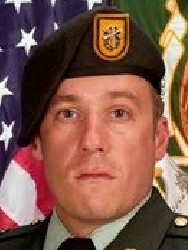

WISE, BENJAMIN B.
Synopsis:
The President of the United States of America, authorized by Act of Congress July 9, 1918 (amended by an act of July 25, 1963), takes pride in presenting the Silver Star (Posthumously) to Sergeant First Class Benjamin Brian Wise, United States Army, for conspicuous gallantry and intrepidity in connection with military operations against an armed hostile force while serving with Company A, 3d Battalion, 1st Special Forces Group (Airborne), in support of Operation ENDURING FREEDOM in Afghanistan, on 9 January 2012. His gallant actions and dedicated devotion to duty, without regard for his own life, were in keeping with the highest traditions of military service and reflect great credit upon himself, his unit, and the United States Army.
WISE, MICHAEL J.
Synopsis:
The President of the United States of America, authorized by Act of Congress July 9, 1918 (amended by an act of July 25, 1963), takes pleasure in presenting the Silver Star to Staff Sergeant Michael J. Wise, United States Army, for conspicuous gallantry and intrepidity in connection with military operations against the enemy in support of Operation ENDURING FREEDOM in Afghanistan. His gallant actions and dedicated devotion to duty, without regard for his own life, were in keeping with the highest traditions of military service and reflect great credit upon himself, his unit, and the United States Army.


Synopsis:
The President of the United States takes pride in presenting the Silver Star Medal (Posthumously) to James Witkowski, Sergeant, U.S. Army (Reserve), for conspicuous gallantry and intrepidity in action while serving with the 1173d Transportation Company, during a combat logistics convoy battle in support of Operation IRAQI FREEDOM, near Ashraf, Iraq, on 26 October 2005. Sergeant Witkowski's convoy was ambushed and came under fierce, sustained attack; first from small- arms fire and roadside bombs, then by more small-arms fire, onrushing insurgents throwing hand grenades and by rocket-propelled grenades throughout a mile-long kill zone. Sergeant Witkowski manned a .50-caliber machine gun on his armored truck and held the attackers at bay with sustained suppressive fire. An enemy grenade landed in his gun turret. Had he jumped aside, the grenade explosion would have killed three fellow soldiers. Witkowski stayed at his post, continued firing, and took the full blast of the grenade.
Home Town: Surprise, Arizona
Personal Awards: Silver Star (War on Terrorism), Purple Heart
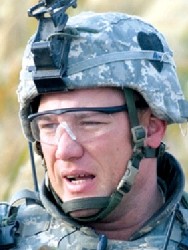

Citation:
The President of the United States of America, authorized by Act of Congress July 9, 1918 (amended by an act of July 25, 1963), takes pleasure in presenting the Silver Star to Staff Sergeant Walter Edward Wolfe, United States Army, for conspicuous gallantry and intrepidity in action against the enemy while serving with Company A, 1st Battalion, 502d Infantry Regiment, 101st Airborne Division, while engaged in combat operations near Baghdad, Ira support of Operation IRAQI FREEDOM. On the afternoon of 31 March 2003, Sergeant Wolfe eliminated two enemy soldiers at short range with a single shot apiece. Without regard for his own safety, Sergeant Wolfe unconcealed himself to enemy fire numerous times by running from position to position. He then proceeded to move toward one enemy bunker, which he cleared with small arms fire. Sergeant Wolfe unconcealed himself to a second bunker, prepared a fragmentation grenade and threw it with great precision into the spot in the bunker where sniper fire was believed to be coming from. In doing so, he single-handedly destroyed a bunker that had pinned down roughly half of the platoon. Staff Sergeant Wolfe displayed bravery above and beyond the call of duty. His courage, leadership and initiative were essential to the platoon's destruction of the ambushing forces and the survival of the platoon. Altogether the platoon inflicted more than forty casualties on the enemy. Staff Sergeant Wolf showed great bravery and personal courage and his actions reflect great credit upon himself, the soldiers of the 101st Airborne Division (Air Assault), and the United States Army.
Home Town: Wilkes-barre, Pennsylvania


Synopsis:
The President of the United States takes pleasure in presenting the Silver Star Medal to Gerald Alex Wolford, Staff Sergeant, U.S. Army, for conspicuous gallantry and intrepidity in action while serving with the 2d Battalion, 162d Infantry Regiment, 1st Cavalry Division, during combat operations in support of Operation IRAQI FREEDOM on 31 March and 1 April 2003, in Iraq. When his gun truck was hit with two rocket-propelled grenades and small-arms fire, Staff Wolford pressed on to lead his heavy machine gun section through a four-hour battle to secure three river crossings in Ah Samawah, Iraq.
Home Town: Oakland, Oregon
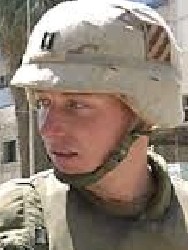

WOLFORD, PHILLIP E.
Citation:
The President of the United States of America, authorized by Act of Congress July 9, 1918 (amended by an act of July 25, 1963), takes pleasure in presenting the Silver Star to Captain Phillip E. Wolford, United States Army, for gallantry in action while serving as the Commander of Company A, 4th Battalion, 64th Armored Regiment, 3d Infantry Division, in combat operations during Operation IRAQI FREEDOM in April 2003. Captain Wolford's company led most task force attacks and he personally killed or repulsed numerous Republican and Special Republican Guard soldiers and combat vehicles using his 9-mm pistol and hand grenade munitions with lethal precision. His heroism enabled the task force to secure key intersections, bridges and Presidential Palaces in breathtaking speed. His actions reflect great credit upon himself, the "Spartan" Brigade Combat Team, the 3rd Infantry Division (M), the United States Army V Corps and the United States Army.
Born: Ohio
WOLTERS, JEFFREY L.
Synopsis:
The President of the United States of America, authorized by Act of Congress July 9, 1918 (amended by an act of July 25, 1963), takes pleasure in presenting the Silver Star to Sergeant First Class Jeffrey L. Wolters, United States Army, for conspicuous gallantry and intrepidity in action against the enemy in support of Operation IRAQI FREEDOM in Iraq. His gallant actions and dedicated devotion to duty, without regard for his own life, were in keeping with the highest traditions of military service and reflect great credit upon himself, his unit, and the United States Army.
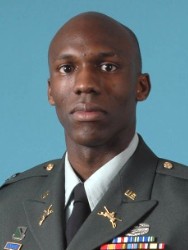

WOOD, MCKINLEY C.
Citation:
The President of the United States of America, authorized by Act of Congress July 9, 1918 (amended by an act of July 25, 1963), takes pleasure in presenting the Silver Star to First Lieutenant McKinley Charles Wood, United States Army, for conspicuous gallantry and intrepidity in action against the enemy while serving as the Platoon Leader of 3d Platoon, Company A, 2d Battalion, 69th Armor Regiment, 3d Infantry Division, in Iraq, in support of Operation IRAQI FREEDOM on 6 to 7 April 2003. With complete disregard for his own personal safety, First Lieutenant Wood repeatedly exposed himself to intense and accurate enemy fire while directing his platoon's fires and maneuver. His platoon was the lead platoon for Task Force 2-69 Armor over 21 days of continuous combat operations in Iraq. His heroic efforts resulted in the destruction of numerous enemy tanks, APC's, and RPG Teams during the attack to isolate Baghdad. His performance of duty in a combat zone reflects great credit upon himself, the Third Infantry Division (Mechanized) "Rock of the Marne", and the United States Army.
Home Town: Atlanta, Georgia


Synopsis:
The President of the United States of America, authorized by Act of Congress July 9, 1918 (amended by an act of July 25, 1963), takes pleasure in presenting the Silver Star to Chief Warrant Officer James Woolley, United States Army, for gallantry in action against an armed enemy while serving as Pilot of a Chinook helicopter of the 3d Battalion, 82d Aviation Regiment (Task Force Talon), 82d Airborne Division, in action in support of Operation ENDURING FREEDOM in Afghanistan, on 4 November 2009. On that date, Chief Warrant Officer Woolley and his crew were called for a casualty evacuation mission in Baghdis Province, Western Afghanistan. As he and his crew approached the pick-up site, his left door gunner reported heavy tracer fire coming at them. Chief Warrant Officer Woolley and his co-pilot maneuvered to avoid the rounds. Once they were able to land, ground troops began loading five wounded Soldiers on the aircraft. Very quickly, the aircraft began taking more enemy fire. With less than a minute on ground, insurgents fired a rocket propelled grenade at Chief Warrant Officer Woolley's Chinook. The round penetrated the nose, flew between the two pilots, and hit the flight engineer in the back of the head before coming to a rest inside the helicopter, unexploded. Chief Warrant Officer Woolley and his crew continued to take a barrage of enemy fire, but he directed the team to stay on ground until the last patient was loaded. Once the fifth patient was loaded, Chief Warrant Officer Woolley led the team out of the hot landing zone and back to a coalition base where the casualties could receive treatment. After it was determined that his aircraft was still flyable, Chief Warrant Officer Woolley made the decision to conduct a second casualty evacuation of several wounded and dead Afghan National Soldiers. Chief Warrant Officer Woolley's gallant actions and dedicated devotion to duty, without regard for his own life, were in keeping with the highest traditions of military service and reflect great credit upon himself, the 82d Airborne Division, and the United States Army.
Home Town: Sanford, California


Citation:
The President of the United States takes pride in presenting the Silver Star Medal (Posthumously) to Matthew Wade Worrell, Major, U.S. Army, for conspicuous gallantry and intrepidity in action while serving as an AH-6 pilot with Company B, 1st Battalion, 160th Special Operations Aviation Regiment (Airborne) on 14 May 2006, while operating against an entrenched enemy force during a daylight raid in support of Operation IRAQI FREEDOM. Major Worrell continued to make successive assaults in support of the ground forces, without regard for his own personal safety, until his aircraft was shot down. His actions destroyed several enemy positions, enabling the ground forces to consolidate into defensive positions. Without Major Worrell's courage and gallantry under hostile fire, the ground forces would have sustained significant casualties. He directly contributed to the successful execution of this direct action mission. Major Worrell's distinctive accomplishments are in keeping with the finest traditions of military service and reflect great credit upon himself, this command, and the United States Army.
Born: April 4, 1972 at Lewisville, Texas
Home Town: Lewisville, Texas
Personal Awards: Silver Star (War on Terrorism), 2@ Bronze Stars, 4@ Air Medals w/V, Purple Heart


Synopsis:
The President of the United States takes pleasure in presenting the Silver Star Medal to Ryan L. Worthan, Major (Infantry), U.S. Army, for conspicuous valor and gallantry while serving with Company A, 1st Battalion, 87th Infantry Regiment, 10th Mountain Division, in action against al-Qaeda and Taliban guerillas during combat operations in support of Operation ENDURING FREEDOM, on 29 September 2003, at Shkin Fire Base in Afghanistan. Major Worthan distinguished himself by his leadership during a 12-hour battle at the fire base, which served as a choking point of enemy fighters coming out of the mountains on the Afghanistan and Pakistan border. Major Worthan's actions led to more than 20 al-Qaeda and Taliban guerrillas being killed after he ordered several Apache attack helicopters and an A-10 Warthog gunship into the area.
Home Town: Iowa
WRIGHT, CURTIS L.
Synopsis:
The President of the United States of America, authorized by Act of Congress July 9, 1918 (amended by an act of July 25, 1963), takes pleasure in presenting the Silver Star to Staff Sergeant Curtis Lanier Wright, United States Army, for conspicuous gallantry and intrepidity in connection with military operations against an armed hostile force while serving in support of Operation IRAQI FREEDOM in Iraq. Staff Sergeant Wright's gallant actions and dedicated devotion to duty, without regard for his own life, were in keeping with the highest traditions of military service and reflect great credit upon himself, his unit, and the United States Army.
WRIGHT, JOSHUA D.
Synopsis:
The President of the United States of America, authorized by Act of Congress July 9, 1918 (amended by an act of July 25, 1963), takes pleasure in presenting the Silver Star to Captain Joshua Daniel Wright, United States Army, for conspicuous gallantry and intrepidity in connection with military operations against an armed hostile force while serving with Company A, 3d Battalion, 15th Infantry Regiment, 2d Brigade Combat Team, 3d Infantry Division, in support of Operation IRAQI FREEDOM in Iraq on 7 April 2003. Captain Wright led his company with exceptional valor during 3 days of intense combat on objective MOE. His leadership resulted in the destruction of more than 60 vehicles and their crew, and over 200 well-armed enemy infantry. Captain Wright's heroic leadership and dedicated devotion to duty, without regard for his own life, were in keeping with the highest traditions of military service and reflect great credit upon himself, the 3d Infantry Division, and the United States Army.
Home Town: Girdd, Illnois
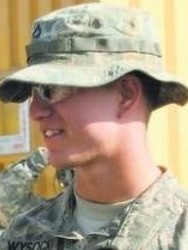

Synopsis:
The President of the United States of America, authorized by Act of Congress July 9, 1918 (amended by an act of July 25, 1963), takes pleasure in presenting the Silver Star to Private First Class Phillip A. Wysocki, United States Army, for gallantry in connection with military operations against an opposing armed force while serving with Company A, 1st Battalion, 502d Infantry Regiment, 2d Brigade Combat Team, 101st Airborne Division, in action on 1 November 2010, in support of Operation ENDURING FREEDOM in Afghanistan. Private First Class Wysocki distinguished himself through exemplary duty performance and intestinal fortitude under heavy enemy fire after a suicide vehicle borne improvised explosive device attack, which contributed significantly to facilitating casualty evacuation operations and repelling the enemy attack. His gallant actions and dedicated devotion to duty, without regard for his own life, were in keeping with the highest traditions of military service and reflect great credit upon himself, his unit, and the United States Army.
Home Town: Hebron, Kentucky

